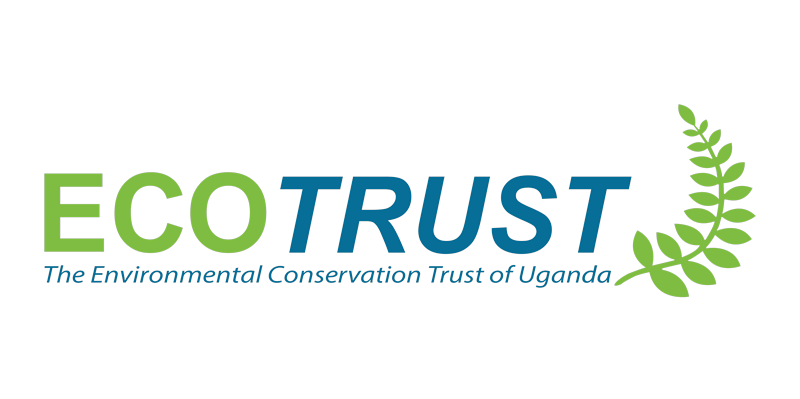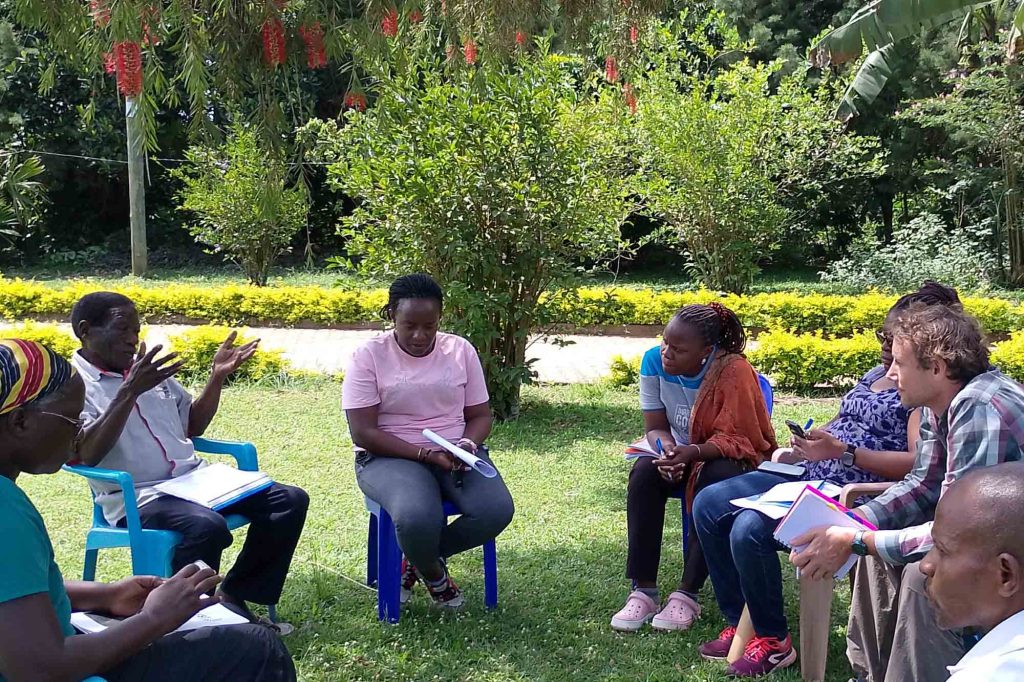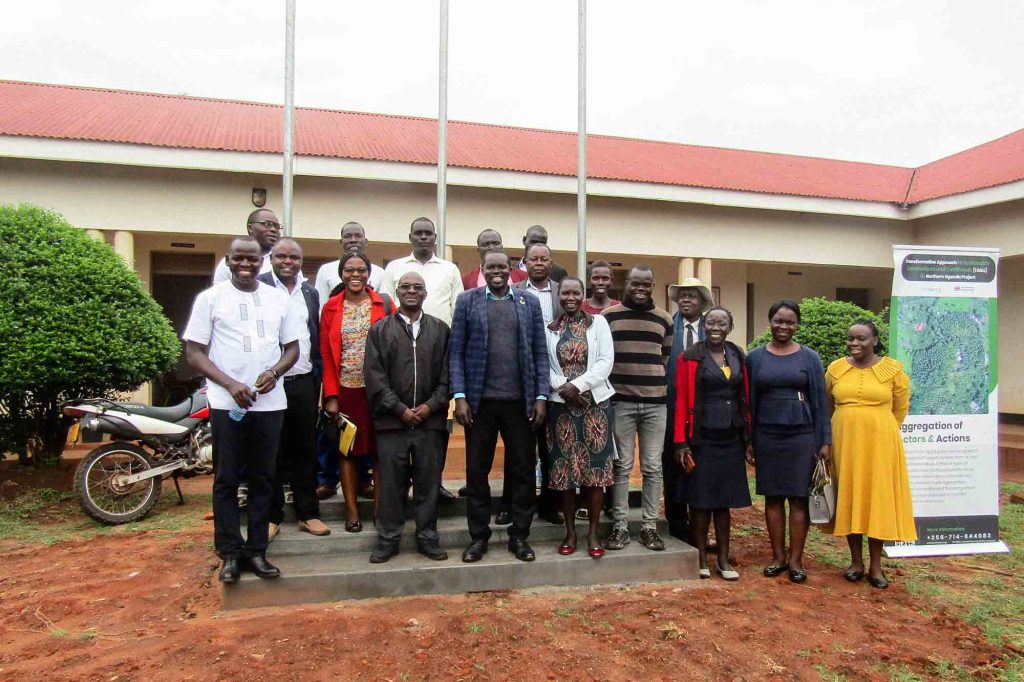
Transformative Approach to Sustainable Landscapes and Livelihoods in Northern Uganda Project
TASLL Project
2024 - 2027
Building Sustainable Landscapes and Livelihoods through Paymments for Environmental Services (PES) based Market Incentives for Undertaking Restoration as a Business.

Enhanced Adaptive & Restoration Capacity
Enhanced Mitigation Potential through PES
Building Resilience through Market-Based Sustainability Models
Strengthening the enabling Institutional and Policy Environment
ECOTRUST, through the TASLL Northern Uganda Project, is working to conserve over 65,548 hectares of natural forest in the Agoro-Agu landscape of the Acholi sub-region, spanning Lamwo, Pader, Kitgum, and Agago districts. The project aims to sustainably reforest 15,000 hectares with 6 million native trees over four years, including areas within refugee camps. It will also establish 4 new Collaborative Forest Management (CFM) Agreements with the NFA and 4 Community Land Associations (CLAs) to manage community forests. A 25-year market-based sustainability model will balance restoration with livelihoods improvement, linking payments for ecosystem services (PES) and non-timber forest products (NTFPs) to green value-chain enterprises and private sector off-takers. In addition, ECOTRUST will expand its Trees for Global Benefits (TGB) program across the Agoro-Agu Forest Sector and Achwa River Range using a landscape approach.
An Inclusive Climate Resilient Landscape and livelihoods in the East Acholi Sub-Region, Northern Uganda, where multiple stakeholders collaborate to manage the role ecosystems play in climate resilience and sustainable development.
The project will conserve 65,000 hectares in the East Acholi region through farmer-led agroforestry systems and woodlots, planting 6 million native trees on 15,000 hectares over four years. It will establish 4 CFM agreements with the NFA (30,000 hectares) and 4 Communal Land Associations (20,000 hectares).
Enhanced Mitigation Potential through a Payment for Ecosystem Services (PES)-based Incentive scheme that aggregates and compensates Environmental Services under the Plan Vivo System.
Building Resilience through a Market-based Sustainability Model that develops multiple income streams from nature-based green enterprises and climate resilient value chains and market linkages –for increased and diversified incomes.
Strengthening the enabling Institutional and Policy Environment - Strengthened institutional and regulatory systems for climate responsive planning and adoption of ecosystem-based strategies in the 4 operational districts
Target groups include the National Forestry Authority, local governments, private landowners, churches, schools, and smallholder farms. In addition, 30,000 hectares will be reforested through 7 existing and 8 new CFM groups and Community Land Associations. The Palobek refugee settlement is also a key target for tree planting efforts.
The project aims to achieve enhanced adaptive and restorative capacity by conserving over 65,000 hectares, increased mitigation potential through a PES-based incentive scheme compensating ecosystem services, and strengthened sustainability through diversified natural resource-based income streams. The project fosters resilience by supporting institutional and policy development for long-term impact.
Hectares of Land Secured Voluntarily
Trees Grown
Hectares Conserved through CFM Arrangements
Hectares Conserved through CLAs
Generated through Local Green Businesses
Carbondioxide Sequestered
Formal and Informal Jobs Created

ECOTRUST’s work streams will be guided by three core approaches:
- Market Systems Facilitation Approach: ECOTRUST will introduce market-based incentives through Payments for Ecosystem Services (PES) to promote both environmental protection and productivity. Tree-growing households will receive performance-based payments over 10 years, tied to 25-year carbon sequestration contracts, incentivizing long-term sustainability.
- Participatory Design Approach: Using tools from the Gender Action Learning Systems (GALS) methodology, ECOTRUST will engage communities in joint planning and visioning exercises. This process will empower them to envision their desired futures, identify challenges and opportunities, and map out pathways for achieving their goals.
- Graduation Approach: ECOTRUST will engage vulnerable households across the four districts through an inclusive process, also rooted in the GALS methodology, to develop tailored interventions that meet their specific needs.
The overarching goal of these interventions is to “Create an inclusive climate resilient landscape and livelihoods in Agoro-Agu where multiple stakeholders collaborate on managing the role ecosystems play in climate resilience and sustainable development.”


Desired Impact
A Climate Resilient Landscape and livelihoods established in the 4 Districts of Agogo, Kitgum, Lamwo and Pader in Agoro-Agu landscape, Acholi Sub- region, Northern Uganda
Outcome 1
Adaptive and Restorative capacity enhanced through sustainable reforestation (voluntary long-term recruitment and land-use planning beyond project life)
Outcome 2
Mitigation capacity and Community-owned landscape restoration as a business enhanced (seedlings’ production, distribution, planting, and monitoring beyond project life)
Outcome 3
Long-term PES-based sustainability incentive Model for sustained landscape restoration and improved livelihoods through business incubation for multiple green enterprises/business cases.
Output 1
15,000ha of land secured from 4 districts to grow 6 million trees over 4 years.
- Voluntary recruitment of over 10,000 smallholder growers based on free and prior informed consent.
- 25-year contracts and land use plans developed by all growers to ensure sustainability and a balance between tree growing and food security.
- Recruitment continued for atleast 10 years beyond the project life.
- 4 new collaborative forest management groups established (appx 30,000ha)
- 20 Community GALS Champions trained.
Output 2
Suitable tree species identified and local nursery operators pre-qualified, trained and contracted to produce 6 million seedlings in 4 years.
- Over $1.6 million paid out to nursery operators in 4 years. Tree seedling sales continued after project life.
- Community seedling production, distribution, monitoring and payment system developed.
- Digital MRV system set up to map and upload recruited parcels and compute carbon sequestered.
- Local Forest Monitors trained and deployed to guide distribution, planting, growth and survival of trees beyond 10 years.
- 6 million trees planted over 4 years and over 12 million in 8 years.
- 12 Farmer Centres of Excellence for peer learning and extension services (CEPLES) established.
Output 3
PES aggregation and sales scheme designed for all 10000 growers for 25 years. Additional farmers added after project life
3.5m tCO2 sequestrated and sold through a diverse portfolio of international buyers. Additional tons added after project life
Over $17m private sector FDI flow into Agoro-Ago landscape as payables to local growers over 10yrs. More payable after project life. 60% direct cash performance-based payments made to all 10,000 growers based their contracts.
A Community Carbon Fund (CCF) established for Insurance and Business Incubation.
Each HH treated as an economic unit and over10,000 green enterprises set up & linked to off-takers through a GIVES Facility.
Over 50,000 informal jobs created in the landscape around tree growing
Strategy 1
Intensive Community Engagement and visioning at all levels using GALS methodology to create awareness, interest, and demand for FPIC-based voluntary land recruitment into the program over the 4 years
Strategy 2
Create a Business ecosystem around tree growing through community-led production, distribution, planting and growing of 6 million tree seedlings in 4 years.
Strategy 3
Develop a 25-year sustainability incentive model beyond project life through ex-ante payments for environmental services (PES), Business Incubation for Green enterprises, and informal job creation for all participating households as economic units
- Latest news from the tasll project
FCDO Delegation Visits ECOTRUST Project Sites in Murchison Falls Landscape and Northern Uganda
A team from the Foreign, Commonwealth & Development Office (FCDO) in Uganda recently visited ECOTRUST project sites in the Murchison Falls Landscape and Northern Uganda. From September 29 to October…
ECOTRUST Launches TASLL Northern Uganda Project to Drive Climate Resilience and Sustainable Livelihoods
ECOTRUST has officially launched the Transformative Approach to Sustainable Landscapes and Livelihoods (TASLL) Northern Uganda project, funded by the Foreign, Commonwealth & Development Office (FCDO). This initiative aims to create…




Follow Us On